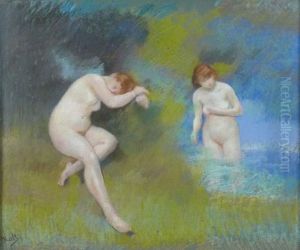Albert Philippe Roll Paintings
Albert Philippe Roll was a distinguished French painter, born on March 2, 1846, in Paris, France. Emerging from a period rich in artistic innovation and cultural transformation, Roll's work navigated through the realms of academic painting while embracing the evolving currents of his time. His career spanned the latter half of the 19th century and the early years of the 20th century, a period marked by rapid changes in art and society.
Educated at the École des Beaux-Arts in Paris, Roll was a student of Jean-Léon Gérôme, a prominent figure in French academic painting. This background provided him with a solid foundation in the techniques and principles of traditional art, which he would both adhere to and depart from throughout his career. Roll's work initially focused on portraits and historical subjects, demonstrating his skill in capturing both the physical likeness and the inner character of his sitters, as well as his ability to create compelling narrative scenes.
As he matured as an artist, Roll's interests expanded to include scenes of contemporary life, reflecting the social realities and challenges of his time. He was particularly noted for his depictions of the working class, which he portrayed with dignity and empathy. Through these works, Roll contributed to the broader movement of Naturalism in art, which sought to represent everyday life with honesty and accuracy.
Albert Philippe Roll achieved considerable acclaim in his lifetime, receiving numerous awards and honors. He was a regular participant in the Paris Salon, the prestigious annual art exhibition in France, where he garnered several medals. In 1883, he was awarded the Legion of Honour, France's highest order of merit for military and civil merits, a testament to his contribution to French art and culture.
Despite his success, Roll remained committed to exploring new subjects and techniques, demonstrating a willingness to evolve with the times. His legacy is that of a versatile and compassionate artist, whose work bridged the gap between the academic traditions of the past and the more modernist impulses of the early 20th century. Albert Philippe Roll passed away on December 27, 1919, leaving behind a body of work that continues to be appreciated for its technical mastery and its sensitive portrayal of human life.
